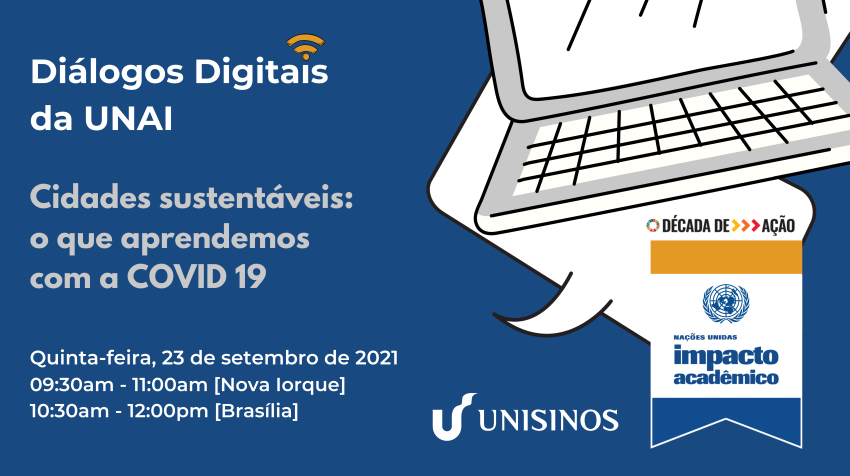On 23 September 2021, the United Nations Academic Impact (UNAI) and the University of Vale do Rio dos Sinos (UNISINOS), a UNAI member institution in Brazil that also serves as the SDG Hub for Goal 11: Sustainable Cities and Communities, co-organized an online event in Portuguese language, as part of a series of global conversations with scholars, educators, researchers, and students to discuss priorities for the future, obstacles to achieving them, and the role of international academic cooperation in addressing global issues. The webinar aimed to reflect on the importance of universities in promoting the concept of sustainability in urban centers from various perspectives, analyze the impact of the ongoing COVID-19 pandemic, and understand what opportunities may arise from this crisis.
After a brief welcome from UNAI's Public Information Officer Omar Hernández, Professor Aline Bueno, SDG Hub 11 focal point at UNISINOS, introduced the event's objective. The first speaker was Rayne Michelli Ferretti Moraes, National Official for Brazil at the United Nations Human Settlements Programme (UN-Habitat). Moraes mentioned the issue of housing quality, cities as epicenters of pandemics due to the high concentration of people and activities, and how much we realized that the world was more connected than we thought. She also highlighted how the pandemic impacts differ depending on territory, skin color, and gender and that they were more significant in informal settlements. Moraes also pointed out the valorization of open public spaces, the importance of monitoring changes in urban mobility in new formats of work and education.
Finally, the expert from UN-Habitat highlighted resilience as a central theme, that is, how the cities are prepared or not for these shocks and how to respond effectively and faster in the future. Along these lines, Professor Izabele Colusso, Coordinator of the Undergraduate Course in Architecture and Urbanism, and of the Specialization in Cities - Strategic Management of the Urban Territory, both at UNISINOS, pointed out some aspects of the three dimensions of sustainable development that can help us understand how the pandemic has changed our cities and what opportunities can arise from there. Concerning the economic dimension, she mentioned the reinforcement of local productivity networks, the search for markets close to homes, and services closer to urban areas.
As for the environmental dimension, she raised issues related to the worst performance indicators of those places with more precarious green and blue infrastructures. Professor Colusso also underlined the search for contact with nature, the urgency to use public squares and qualified urban spaces. Regarding the social dimension, she talked about the leading role of municipal governments in adopting prevention strategies that prioritize a localized view, more connected to people's lives and routines. And she ended her remarks by stressing the relevance of community participation and the stakeholders' dialogue. In this sense, she mentioned as an example the actions of curricularization of extension actions carried out by UNISINOS as a best practice to be shared.
The third speaker was Maria Manuela Pires Rosa, Responsible and Professor of the Postgraduate Course in Sustainable Cities at the University of Algarve (Portugal) and Co-Author of the Sustainable Mobility Project of the Portuguese Environment Agency. Rosa said that the pandemic showed the need for proximity urbanism, in which people can consume from local businesses, get around on foot and by bicycle and enjoy a network of green and blue infrastructures. The temporary management of urban spaces was another aspect raised in which the change in mobility patterns became urgent. Rosa brought out the need to make cities more digitally inclusive, allowing greater access to the internet for school-age young people and the elderly.
The speaker from Portugal also commented on the impact of silence on cities, which made possible a greater appreciation of nature and consequently pointed to the importance of biodiversity and ecosystem services. As for the role of academia, she stated that teaching tactical urbanism is essential, promoting the re-appropriation of urban space by the people who use it. Finally, Jorge Abrahão was the fourth and last speaker. Abrahão is the CEO of the Sustainable Cities Institute, a Professor at the Polytechnic School of the University of São Paulo (Brazil), and a columnist for Folha de São Paulo, a leading Brazilian newspaper. He presented data on the impacts of the COVID-19 pandemic in the city of São Paulo, highlighting the inequality between neighborhoods with different socioeconomic profiles.
He also pointed out that it is necessary to have a public policy that prioritizes investments in the most vulnerable places and improves democracy in the field of society's participation, creating more spaces for listening and forms of governance that incorporate civil society at all levels. On the other hand, he also called attention to the need for governance connected with global issues such as climate change, migration, and the pandemic itself. Finally, he ended by presenting the Sustainable Cities Development Index website (available here in the Portuguese language), whose intention is to guide municipal political action, define references and goals based on management indicators and facilitate the monitoring of the SDGs at the local level.




